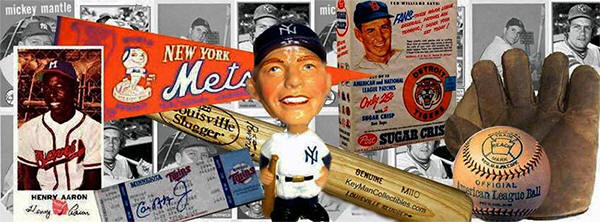
Founded
in 1889, Anchor Brand baseball
manufacture, J. deBeer and Son
specialized in private branding.
They would produce baseballs for
another company and place the name
brand of that company on the ball.
A service all of the major sporting
goods manufacturers would offer.
Large mail order catalogs, hardware
and department stores would take
advantage of this service to
promote their name brand, being
sold along side suppliers of sports
equipment.

From 1908 until 1961 Sears, Roebuck & Company sold a wide variety of
sporting goods, under the brand
name "J. C. Higgins." John Higgins
was the manager of the
headquarters' office bookkeepers.
John Higgins consented to Sears use
of his name for a new line of
sporting goods. Since he did not
have a middle initial, Sears added
the "C." In 1908, the Western
Sporting Goods Company in Chicago
began putting J.C. Higgins on
baseballs and baseball gloves sold
in Sears catalogs. The J.C. Higgins
brand disappeared shortly after
Sears introduced the Ted Williams
brand of sporting goods in 1961.

The
Belknap Hardware & Mfg Co.,
wholesale hardware supply was
established in 1840. They began by
producing iron products, such as
horse and mule shoes, nails, spikes
and other forged items in a small
shop. Since 1890 their catalog
included a line of sporting goods
that included baseball gloves,
bats, and baseballs that were made
and branded by other manufacturers.
The "Energized Center League Ball"
pictured here, was manufactured and
is a J.deBeer & Son trademark
baseball.

Starting as a clerk at a sporting goods store called Johnson &
Stoughtenburgh, Alex Taylor founded
Alex Taylor & Co. in 1897. At one
time it was one of the major
Sporting Goods store located in New
York. American League owners of MLB
teams provided baseballs, bats, and
gloves to the doughboys serving
overseas, as part of the WWI "Bat
and Ball fund." Alex Taylor & Co.
placed an advertisement in the
Stars and Stripes that showed a
hurdling doughboy over the caption
"Athletes Make the Best Fighters"
That advertisement then announced
that the company had been awarded a
contract to fill the sports need of
the troops, which included Taylor
League Baseballs.

The
J.H. Grady
Manufacturing Co. was organized as
a subsidiary of Rawlings Sporting
Goods in 1923 for the production of
Rawlings baseballs. John Henry
Grady, who made baseballs for
Rawlings as a youngster, was named
President. In 1946 Rawlings
acquired the J.H. Grady Production
Organization. This was Rawlings'
entry into baseball and softball
creation. This acquisition paved
the way for Rawlings to develop
into the official baseball of Major
League baseballs in 1977. John H.
Grady assignor to J.H. Grady held a
number of patents for the
manufacturing of baseballs and
softballs. The J.H. Grady Trademark
"Duro seam" was patented in 1932,
and was used by all the Major
baseball manufactures including
Spalding, Reach, Wilson and
Rawlings.

Not to be confused with P. Goldsmith & Sons Sporting Goods of Cincinnati,
Goldsmith’s Inc. of Wichita, a
book & stationary store, was
established in 1887. They became
one of the country’s largest office
furniture dealers, and eventually,
in 1900, expanded their inventory
to sporting goods, which included a
line of baseballs, bats and gloves.
The late 1920s, Goldsmith hired Ray
“Hap” Dumont to grow the company’s
sporting goods business. Dumont
became the head of the National
semi-professional baseball
tournament in Wichita. In 1935
Dumont organized his first National
tournament, whose most valuable
player was none other than Satchel
Paige.

Making baseballs since 1902, Russian Immigrant Meyer Tober was a
co-founder of
Bon-Tober Sporting Goods in
1912. From their factory located in
Hartford CT. the company
manufactured leather sporting goods,
which included baseballs. The
company was purchased in 1927 by
the McKinnon Dash Co. a manufacture
of dashboards for horse drawn
buggies dating back to 1878. For a
short transition period products
were sold with the Bon-Tober/McKinnon
brand name. After the McKinnon
buyout, Meyer Tober formed the
Tober Baseball Manufacturing Co. in
Manchester, manufacturing Eagle
brand baseballs and softballs.

In 1964, the President of the Tober Baseball
Manufacturing Co. Meyer Tober, Age
82, was
shot & murdered by employee
Adino Ryes. The
day before the shooting Tober had
been talking to Ryes who had been
considering committing suicide
because of family problems. Tober
had tried to talk him out of it,
and urged Ryes to see a doctor. The
company continued to operate until
1970 when a factory fire might have
closed them down. The Tober family
was committed in getting the
factory up and running, but there
is no news thereafter.

This baseball was privately branded for Red Goose Shoes. Established in
1869 in St. Louis, Missouri, the
Red Goose Shoe company merged with
the International Shoe Company in
1911. The Red Goose logo was
trademarked in 1906, and was used
on many promotional items such as
Red Goose story books, Golden Eggs,
banks, Notepads, Shoehorns etc...
The Shoe store also had baseballs,
bats, and gloves produced for them
with the
Red Goose Shoes branding.


